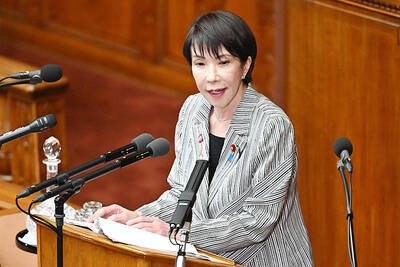The Ministry of Culture yesterday scrapped the Public Television Service’s (PTS, 公視) “international video platform” after it sparked controversy following reports that the Democratic Progressive Party (DPP) tried to use the platform as a mouthpiece and interfere with its personnel plans.
The ministry in a statement thanked the PTS board — which on Monday voted 11-4 to pass a pilot project to develop an “international communication digital plan” — for its support.
However, the ministry said that to prevent the controversy from spreading, it has terminated the international video platform commission following a careful and comprehensive assessment.

Photo: Chung Chih-kai, Taipei Times
The direction of the ministry’s policy in promoting the project would not change, it said, adding that it would continue to seek advice from various circles and find the best way to execute the project.
Executive Yuan spokesman Ting Yi-ming (丁怡銘) said that the Executive Yuan respects the ministry’s decision, as well as the PTS’ independence.
The Executive Yuan would not interfere with the production and broadcasting of PTS programs, he said.

Photo: Chen Yu-hsun, Taipei Times
As there are differing opinions about the ministry commission within PTS, the Executive Yuan respects PTS’ opinion, he said.
Board member Hsu Jui-hsi (徐瑞希) yesterday said that she would resign from the PTS board in protest of the ministry’s decision to dissolve the commission.
She saw a detailed version of the international video platform plan at an extraordinary board meeting on Monday, Hsu said.
Although some of the political vocabulary in the proposal was not handled well, she believed that PTS was capable of executing the project, Hsu added.
She believed that it could be left to the new board and management team to make adjustments, which is why she had voted in favor of the project, she said.
The ministry had previously said that it respects the board’s decision, she said, accusing the ministry of contradicting itself.
PTS said it respects Hsu’s decision to resign from the board.
The ministry has terminated the application for the case, it said, calling for rational discussion among various groups on how an international video platform could be planned.
At Monday’s board meeting, three PTS executives — PTS president Tsao Wen-chieh (曹文傑), executive vice president Hsieh Tsui-yu (謝翠玉) and news department manager Su Chi-chen (蘇啟禎) — tendered their resignations.
PTS yesterday said planning department manager Hsu Chiu-hua (徐秋華) would serve as acting president from Saturday until a president is selected and the handover has been completed.
The New Power Party (NPP) said that the ministry should give a comprehensive briefing to lawmakers on the legislature’s Education and Culture Committee about controversies over its proposed creation of the international video platform, even though it has canceled the project.
NPP Chairman Hsu Yung-ming (徐永明) told a news conference in Taipei that controversies surrounding the project would not go away simply because the ministry has terminated it.
The government is obligated to tell lawmakers what it plans to do with the NT$5.8 billion (US$196.6 million) budget that had been earmarked for the platform, Hsu said.
“The DPP should realize that it cannot equate public media with state-controlled media. PTS is a public media outlet, which is owned by the public, and should maintain its independence,” he said.
“It should not yield to the government’s every demand only because it receives funding from the ministry,” he added.
Additional reporting by Shelley Shan and Lin Nan-ku

‘SECRETS’: While saying China would not attack during his presidency, Donald Trump declined to say how Washington would respond if Beijing were to take military action US President Donald Trump said that China would not take military action against Taiwan while he is president, as the Chinese leaders “know the consequences.” Trump made the statement during an interview on CBS’ 60 Minutes program that aired on Sunday, a few days after his meeting with Chinese President Xi Jinping (習近平) in South Korea. “He [Xi] has openly said, and his people have openly said at meetings, ‘we would never do anything while President Trump is president,’ because they know the consequences,” Trump said in the interview. However, he repeatedly declined to say exactly how Washington would respond in

Japanese Prime Minister Sanae Takaichi said yesterday that China using armed force against Taiwan could constitute a "survival-threatening situation" for Japan, allowing the country to mobilize the Japanese armed forces under its security laws. Takaichi made the remarks during a parliamentary session yesterday while responding to a question about whether a "Taiwan contingency" involving a Chinese naval blockade would qualify as a "survival-threatening situation" for Japan, according to a report by Japan’s Asahi Shimbun. "If warships are used and other armed actions are involved, I believe this could constitute a survival- threatening

WARFARE: All sectors of society should recognize, unite, and collectively resist and condemn Beijing’s cross-border suppression, MAC Minister Chiu Chui-cheng said The number of Taiwanese detained because of legal affairs by Chinese authorities has tripled this year, as Beijing intensified its intimidation and division of Taiwanese by combining lawfare and cognitive warfare, the Mainland Affairs Council (MAC) said yesterday. MAC Minister Chiu Chui-cheng (邱垂正) made the statement in response to questions by Democratic Progressive Party (DPP) Legislator Puma Shen (沈柏洋) about the government’s response to counter Chinese public opinion warfare, lawfare and psychological warfare. Shen said he is also being investigated by China for promoting “Taiwanese independence.” He was referring to a report published on Tuesday last week by China’s state-run Xinhua news agency,

‘ADDITIONAL CONDITION’: Taiwan will work with like-minded countries to protect its right to participate in next year’s meeting, the foreign ministry said The US will “continue to press China for security arrangements and protocols that safeguard all participants when attending APEC meetings in China,” a US Department of State spokesperson said yesterday, after Beijing suggested that members must adhere to its “one China principle” to participate. “The United States insists on the full and equal participation of all APEC member economies — including Taiwan — consistent with APEC’s guidelines, rules and established practice, as affirmed by China in its offer to host in 2026,” the unnamed spokesperson said in response to media queries about China putting a “one China” principle condition on Taiwan’s